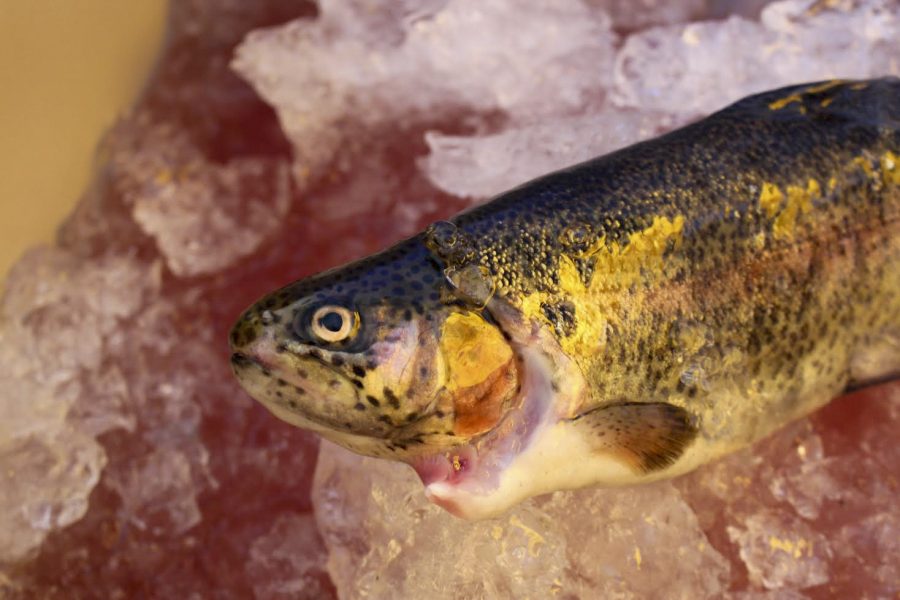Exploring NYU’s Seafood Practices
Seafood is readily available around New York City, but its sources may be more questionable than you think.
September 19, 2016
The Lipton Dining Hall has long been at the center of NYU’s sustainability and health efforts, but its more antiquated seafood practices may be subject to criticism as global fish populations are threatened by overfishing. Managed by NYU vendor Aramark, Lipton uses sustainable fish farms to source its meals, including the baked Alaskan Pollock fillet cooked with lemon, parsley and thyme served last Friday. But at what cost do we get these fish?
So far, these Fish Fridays have been a hit among the student population primarily due to taste. Each Friday, a certain fish dish is served for both lunch and dinner. Stern freshman Matthew Chen particularly enjoyed last week’s fish entree and thought it was better than most of Lipton’s
typical offerings.
“My friend had three plates and we agreed that the flavors blended perfectly for a light, creamy taste,” Chen said. “It was one of the best meals I’ve had on campus so far.”
Lipton Dining prides itself on cage-free eggs, seasonal local fruits and meatless Mondays, but seafood at NYU has been a particular challenge with mixed results. NYU Environmental Studies Professor Jennifer Jacquet has developed her career analyzing different environmental practices, including fish farming, from an economic perspective.
According to Jacquet, the first step in understanding NYU’s seafood is to look at the species and its sourcing.
“If you are not certain of the species, where it is caught or how it is caught, it is very difficult to talk about sustainability,” Jacquet said.
Roughly 30 percent of NYU’s food ingredients have been sourced locally, but seafood appears to remain an exception. In September, the fish it served primarily came from Alaska in the northern Pacific Ocean and Southeast Asian waters such as the Mekong River Delta. Lipton advertises on the NYU Dining Services website that its seafood comes from sustainable farming practices, but fails to disclose which practices or where specifically these farms are located. Additionally, NYU’s sustainability rating has stagnated, with its long-expired 2011 Gold rating for the STARS Higher Education program.
NYU currently partners with the Monterey Bay Aquarium Seafood Watch Program and the Marine Stewardship Council, and has reported in past years that 60 percent of Lipton’s seafood is certified as sustainable. But seafood status outside of Lipton’s program remains unclear, with fewer reported statistics and less monitoring.
Recently, overfishing and fishing farm malpractice has become a larger issue globally and may affect NYU’s dining options in the near future. While Lipton’s current two most common types of seafood, Alaskan Pollock and Pangasius Catfish, are not in danger of overfishing, crowd favorites such as the smoked salmon at Palladium Dining Hall’s Sunday Brunch are under threat. The International Monetary Fund tracks farm-bred salmon as a commodity and estimates that prices have increased 59 percent in the last year. Cited causes include fish scarcity and expensive farming practices. Additionally, more obscure fish species have been rebranded, such as “Rock Salmon,” formerly known as Lesser-Spotted Dogfish, so that salmon fans are more accepting.
As these price and marketing trends in fish markets change, NYU will need to further examine its seafood sustainability practices.
Professor Jacquet suggests turning to scallops, oysters and other bivalves.
“Bivalves are the best hope we have for farmed aquatic animals,” Jacquet said. “However, catching wild bivalves can still be very destructive, so understanding where and how each species is caught is still crucial.”
Until NYU comes up with better seafood alternatives, NYU students can enjoy next week’s Fish Friday special, Coconut-Ginger Striped Pangasius, as a sustainable alternative to other dining options.
A version of this article appeared in the Monday, Sept. 19 print edition. Email Anna Chen [email protected].
























































































































































